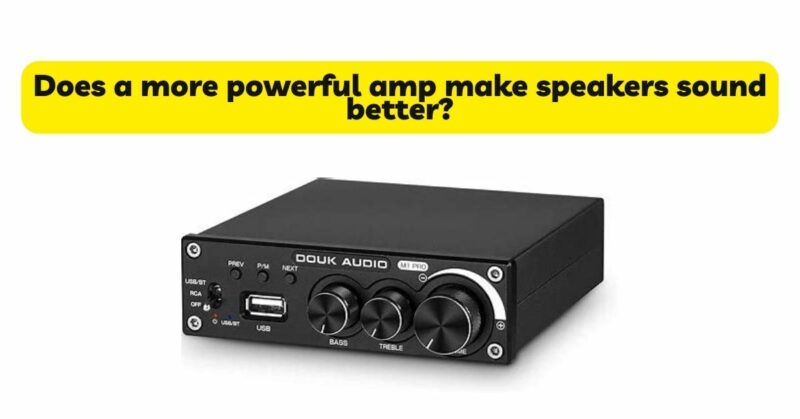When it comes to building a high-quality audio system, the choice of amplifier is a critical factor. One common question that arises is whether a more powerful amplifier will make speakers sound better. In this article, we will delve into the relationship between amplifier power and speaker performance, examining the impact of amplifier power on various aspects of sound reproduction. By understanding the factors at play, you can make informed decisions when selecting amplifiers to optimize your audio experience.
Understanding Amplifier Power and Speaker Performance: Amplifier power refers to the amount of electrical energy an amplifier can deliver to drive speakers. It is typically measured in watts. Speaker performance encompasses several aspects, including sound quality, dynamic range, frequency response, and overall system reliability. The interaction between amplifier power and speaker characteristics plays a crucial role in determining the overall audio performance.
The Myth of “Bigger is Better”: One common misconception is that a more powerful amplifier always translates to better sound quality. However, it is important to recognize that simply increasing amplifier power does not guarantee an improvement in sound. The quality of the amplifier and its ability to deliver clean and controlled power are equally important factors.
Matching Amplifier Power to Speaker Requirements: To achieve optimal sound reproduction, it is essential to match the power output of the amplifier to the power handling capabilities of the speakers. The power handling rating of speakers indicates the maximum power they can handle without distortion or damage. Underpowering or overpowering speakers can lead to various issues, including reduced sound quality, distortion, and potential damage.
Effects of Underpowering: Underpowering speakers with a lower-power amplifier can result in several drawbacks. The lack of sufficient power may limit the dynamic range, leading to compressed and lifeless sound reproduction. Additionally, underpowering may cause the amplifier to operate near its maximum capacity, increasing the risk of distortion and clipping. The speakers may not reach their full potential, resulting in reduced clarity, accuracy, and impact.
Effects of Overpowering: Using a more powerful amplifier than what the speakers require can also have negative consequences. While it may seem counterintuitive, overpowering can lead to inefficient power utilization and potential damage to the speakers. Speakers have limits, and subjecting them to excessive power can strain their components and cause distortion. Furthermore, overpowering can increase the risk of overheating and shorten the lifespan of both the speakers and the amplifier.
Optimizing Speaker Performance: Rather than focusing solely on amplifier power, other factors contribute to enhanced speaker performance:
- Speaker Sensitivity: Sensitivity refers to how efficiently speakers convert electrical power into sound. Higher sensitivity speakers require less power to achieve the same volume level as lower sensitivity speakers. Speakers with higher sensitivity can benefit from lower-power amplifiers, as they can deliver satisfactory volume levels and dynamic range with ease.
- Speaker Impedance: Matching the impedance of the speakers to the amplifier’s output impedance is crucial for optimal power transfer. Mismatched impedance can lead to signal loss and reduced overall performance.
- Speaker Quality and Design: The quality and design of the speakers have a significant impact on sound reproduction. Well-designed speakers with quality drivers, crossovers, and enclosures can enhance overall performance, regardless of the amplifier power.
- Room Acoustics and Listening Environment: Consider the characteristics of the listening environment, such as room size, shape, and acoustic treatments. These factors influence the perceived sound quality. In some cases, room acoustics may require adjustments or additional equipment (e.g., room correction systems) to optimize speaker performance.
The Importance of Balanced System Design: To achieve the best sound quality, it is crucial to consider the entire audio system as a whole. This includes selecting components that complement each other, including the amplifier, speakers, source components, cables, and room acoustics. A balanced system design, where all components work harmoniously together, is essential for optimal sound reproduction.
Conclusion: While amplifier power is an important consideration when building an audio system, simply opting for a more powerful amplifier does not guarantee improved sound quality. The key is to match the amplifier’s power output to the power handling capabilities of the speakers while considering sensitivity, impedance, speaker quality, and room acoustics. A well-balanced system design, where all components work synergistically, will yield the best sound reproduction. By understanding the relationship between amplifier power and speaker performance, you can make informed decisions to create an audio system that delivers exceptional sound quality and an immersive listening experience.


